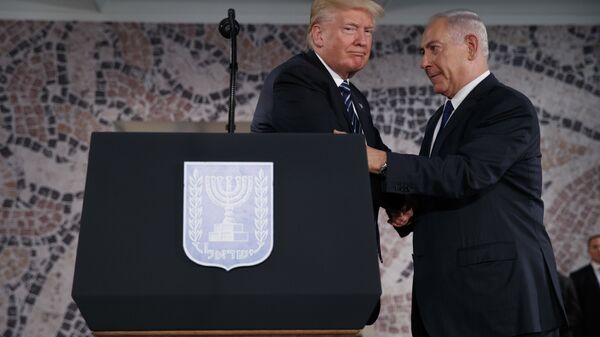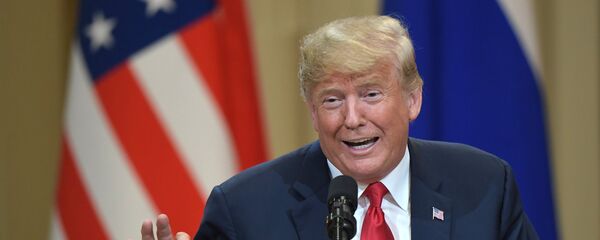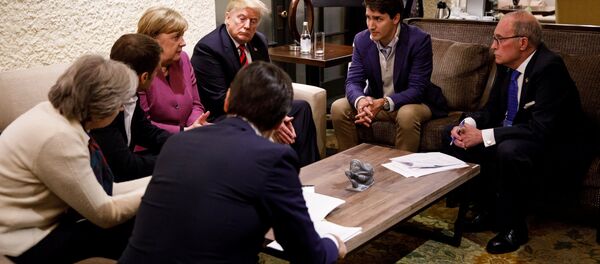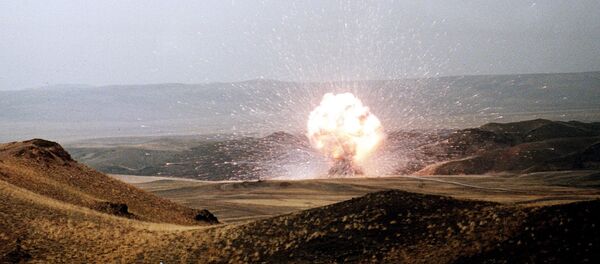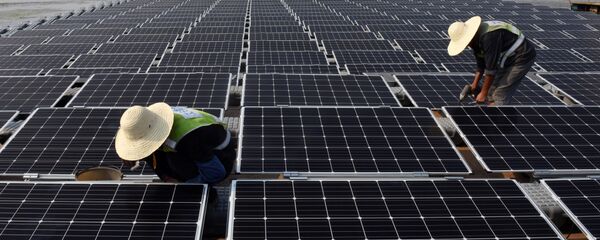US Embassy Transfer to Jerusalem
The US embassy was officially transferred from Tel Aviv to Jerusalem on 14 May – six months after Donald Trump announced the controversial decision to recognise Jerusalem as the capital of Israel and relocate the diplomatic premises there.
READ MORE: Muslim States Protest US Embassy Transfer to Jerusalem (PHOTO, VIDEO)
While the move was welcomed by Israel, it sparked a wave of indignation across the Middle East, with regional states emphasising that the step would threaten the peace process and fuel tensions between Israel and its neighbours.
Although Trump’s decision triggered protests, some countries from across the world announced their plans to follow Washington’s suit, including Paraguay, Guatemala, the Czech Republic, and Brazil. Guatemala also opened its embassy in Jerusalem in May, while Paraguay briefly relocated its diplomatic premises to the city, but moved it back to Tel Aviv shortly after the presidential election in August.
The city of Jerusalem is claimed as a capital by both Israel and the Palestinian Authority, hindering efforts to implement a two-state solution to the long-standing conflict.
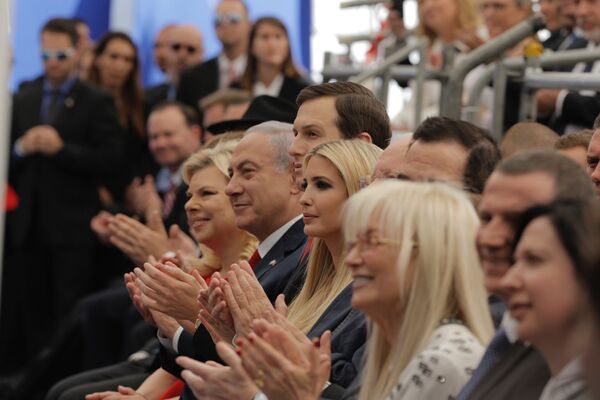
Bye-Bye, Iran Deal
Trump’s May 2018 was marked not only by the official opening of the US embassy in Jerusalem, but also by the unilateral withdrawal from the Joint Comprehensive Plan of Action, an international agreement on Iran’s nuclear programme.
The deal, which he consistently bashed as “horrible” and “one-sided” was reached in 2015 by the permanent members of the UN Security Council – Russia, the US, China, France and the UK, Iran, Germany, and the EU. The agreement implied a gradual lifting of anti-Iran sanctions in exchange for Tehran maintaining the peaceful nature of its nuclear programme.
READ MORE: US Unveils 'Iran Action Group' for Post-Nuke Deal Policy
The president also decided to reinstate “powerful” sanctions against Iran, targeting its financial, shipping, energy and other sectors, and vowing to cut Tehran’s oil exports to zero.
He also promised to impose secondary sanctions on foreign companies doing business with Iran, thus exacerbating tensions with the Islamic Republic. The move was strongly condemned by other signatories to the deal as European leaders struggled to save the agreement.
Historic Trump-Kim Summit
The June negotiations between Donald Trump and Kim Jong-un in Singapore marked the first time that a sitting US president has ever met with a North Korean leader, although the road to the historic summit was bumpy, to put it mildly.
READ MORE: Love is in the Hair: Twitter Mocks 'Historic Hair Swap' at Trump-Kim Summit
After a battle of words (remember “Rocket Man” and “dotard”?) between the two upped the fear of nuclear war across the globe, the two heads of state seemingly managed to develop a special bond, having signed a joint comprehensive document, in which Kim committed to full denuclearisation.
Both leaders emanated an aura of friendship, openness, and warmth, with their momentous handshake becoming the No. 1 trending topic/hashtag/picture on social media.
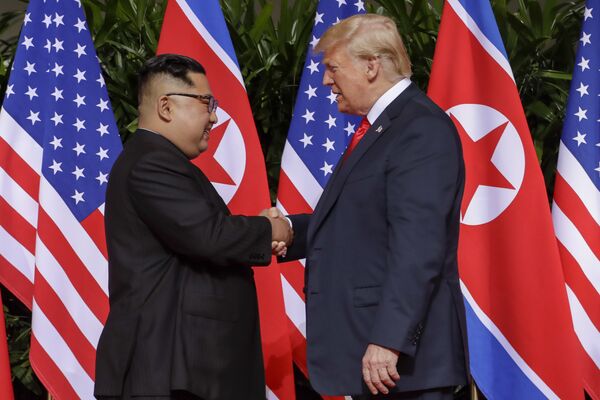
Currently, Washington and Pyongyang are working out the details for a second summit slated for next year.
READ MORE: Twitter Mulls Trump's Chances of Getting Nobel Peace Prize for Summit With Kim
Putin Hysteria Gaining Momentum
While both Donald Trump and Vladimir Putin dubbed the long-awaited summit in Helsinki on 16 July a “success”, the dam of outrage had burst even before the presidents met.
The fact that no communique was issued following the one-on-one rendezvous has been a subject of much concern, fuelling collusion theories in the West, and allegedly prompting Trump to walk back on his comments – he totally accepted US intelligence conclusions.
The lion’s share of US politicians is still pressuring the current administration to disclose interpreter notes from the much-hyped meeting to find out what, if any, pledges Trump made to Putin.
Trilateral Strikes on Syria…. and Troop Withdrawal
On April 14 – only two weeks after Trump stated that American troops would leave Syria “very soon” – the United States, France, and the UK launched over 100 cruise and air-to-surface missiles on a number of targets in the war-torn country in response to an alleged chemical attack in the city of Douma, described by Moscow and Damascus as a false flag.
READ MORE: Syria Accuses US, UK, France of Backing Terror Through Support for White Helmets
The Organisation for the Prohibition of Chemical Weapons (OPCW) said in a report that the investigators found no traces of nerve agents either in environmental samples, or samples collected from alleged victims of the purported chemical attack.
Nine months on, President Trump decided to deliver on his promise and withdraw US troops from Syria, having declared victory over Daesh. POTUS, as is his wont, posted a powerful message on Twitter to explain his decision and tell the troops that “it’s time to come back home”:
After historic victories against ISIS, it’s time to bring our great young people home! pic.twitter.com/xoNjFzQFTp
— Donald J. Trump (@realDonaldTrump) 19 December 2018
Despite facing much pressure in Washington, Trump ordered a full and immediate pull out by the end of March. And, as anti-Russia hysteria continues unabated, media and critics believe that Trump’s U-turn in Syria is part of a secret agreement he had sealed with Putin during the Helsinki summit.
READ MORE: 'We Were Doing the Work': Trump Says Russia, Iran & Syria Local Enemies of Daesh
Since 2015, the US-led coalition has maintained a military presence in Syria without either a UN mandate, or authorisation from Damascus – something which the Syrian government considers illegal.
Transatlantic Rift
In line with his America First approach, President Trump refused to make concessions to his transatlantic allies on a number of issues, including the NATO defence budget, trade, and the nuclear deal with Iran.
READ MORE: 'Trouble-Maker' Trump May Derail G20 Summit, French Media Fears
Having announced that he will no longer allow anyone to take advantage of the United States, Trump imposed 25 percent tariffs on steel and 10 percent on aluminium imports from the EU and Canada, causing the targeted countries to apply tit-for-tat measures.
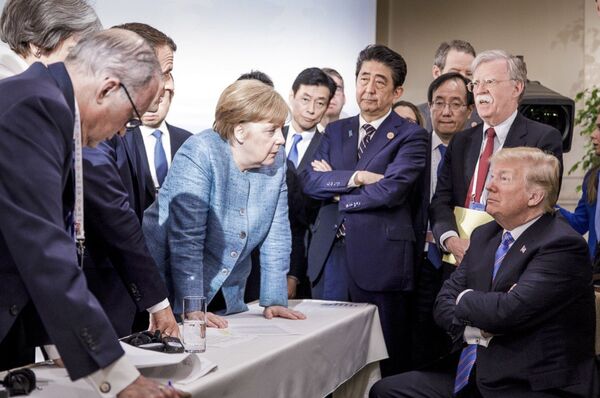
Tensions further exacerbated when Trump refused to provide waivers to European companies doing business with Iran following Washington’s withdrawal from the JCPOA and the introduction of sanctions.
READ MORE: Donald Trump Has a Go at Allies After Discordant G7 Summit
Another bone of contention in transatlantic relations appears to be Europe’s military donations to NATO. Trump, who once questioned the alliance’s raison d’être, has on multiple occasions pressed NATO member states to meet their annual defence spending obligations, insisting on fair burden-sharing.
The idea to increase the defence budgets of member states from 2 to 4 percent of GDP was widely criticised by European leaders, including French President Emmanuel Macron.
In November, Macron suggested building a European army in order to protect the continent from the United States, Russia and China. The idea was endorsed by German Chancellor Angela Merkel, but President Trump launched a Twitter crusade against Macron, dismissing the move as “insulting” and insisting that European states should first pay their fair share for NATO.
President Macron of France has just suggested that Europe build its own military in order to protect itself from the U.S., China and Russia. Very insulting, but perhaps Europe should first pay its fair share of NATO, which the U.S. subsidizes greatly!
— Donald J. Trump (@realDonaldTrump) 9 November 2018
Emmanuel Macron suggests building its own army to protect Europe against the U.S., China and Russia. But it was Germany in World Wars One & Two — How did that work out for France? They were starting to learn German in Paris before the U.S. came along. Pay for NATO or not!
— Donald J. Trump (@realDonaldTrump) 13 November 2018
The idea of a European Military didn’t work out too well in W.W. I or 2. But the U.S. was there for you, and always will be. All we ask is that you pay your fair share of NATO. Germany is paying 1% while the U.S. pays 4.3% of a much larger GDP — to protect Europe. Fairness!
— Donald J. Trump (@realDonaldTrump) 8 December 2018
INF Treaty in Limbo
President Trump has developed a certain reputation for scrapping international agreements: on 20 October, he announced his intention to abandon the 1987 Intermediate-Range Nuclear Forces (INF) Treaty, having accused Russia of violating the accord’s terms and saying that the US would start to develop the type of weapons currently banned under the treaty.
US Secretary of State Mike Pompeo said in early December that Washington would suspend its adherence to the treaty within 60 days unless Russia returned to full compliance with the agreement.
Russian President Vladimir Putin warned that the repercussions of the US decision were unpredictable and could result in a global disaster due to an increasing trend of lowering the threshold for the use of nuclear weapons.
The treaty was signed by the Soviet Union and the US, and envisages the destruction of all nuclear-armed ground-launched ballistic and cruise missiles with ranges between 500 and 5,500 kilometres (about 300 to 3,400 miles).
US-China Trade War Unleashed
Following through with his campaign promise to fix China’s “unfair trade practices”, the Trump administration announced that $50 billion worth of Chinese goods would be subject to 25 percent tariffs, prompting China’s Commerce Ministry to accuse Washington of launching a trade war and warning of symmetric measures.
So far, the US has already slapped China with tariffs on $250 billion worth of goods, and has threatened tariffs on $267 billion more; China, in turn, introduced tariffs on $110 billion worth of US products, and is warning of “quantitative and qualitative” measures that could affect American companies operating in China.
In early December, the US and China struck a 90-day trade war truce: President Trump agreed not to raise tariffs on $200 billion worth of Chinese imports from 10 percent to 25 percent starting on January 1, while Chinese President Xi Jinping promised to purchase more US goods to reduce the trade deficit.
Sanctions for Everyone…
Over the past year, Washington introduced sanctions against:
- Russia over the alleged poisoning attack on Sergei and Yulia Skripal in Salisbury, UK, without providing evidence of Moscow’s purported involvement. The US also ordered the expulsion of 60 Russian diplomats in solidarity with the UK and European allies;
- Iran and Russia over purported oil shipments to Syria;
- Iran – after pulling out of the nuclear deal;
- North Korean officials, including top aide to Kim Jong-un over “human rights abuses”– despite a thaw in Washington-Pyongyang relations;
- Members of Russia’s Main Intelligence Directorate (GRU) for taking part in alleged malign activities, including the 2016 US election meddling, hacking the World Anti-Doping Agency, and the Salisbury attack.
- And many others…
…Except for Saudis Over Khashoggi Case
The United States has been encouraging its transatlantic allies to impose sanctions on a number of countries – mainly without waiting for official investigations to end, but it has been seemingly reluctant to act against Saudi Arabia after Jamal Khashoggi, a Washington Post journalist of Saudi heritage, was killed in the Saudi Consulate General in Istanbul.
Despite pressure from top US senators to take action against the kingdom and cut off weapons sales and military support, President Trump reaffirmed that Washington would not be imposing any punitive measures against Riyadh, stressing that the country’s intelligence was still assessing all the information related to the case.
He emphasised that the US would remain Saudi Arabia’s “steadfast partner” and voiced concern that if US military contracts with Riyadh were to be frozen, the kingdom would simply spend its money on Russian or Chinese weaponry.

